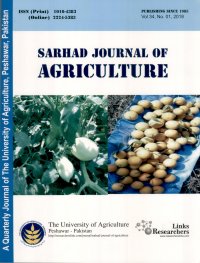Disease-free and Organic Okra (Abelmoschus esculentus L. Moench) Production Through Treatments Combination of Mulching types and Weeding Regimes
Disease-free and Organic Okra (Abelmoschus esculentus L. Moench) Production Through Treatments Combination of Mulching types and Weeding Regimes
Mukhtar Iderawumi Abdulraheem1*, Muhammad Ihtisham2*, Abiodun Yusuff Moshood3, Nawab Khan4, Muhammad Owais Shahid5, Shafiq Hussain6, Kumail Abbas6 and Fawad Zaman7
ABSTRACT
The production and consumption of disease-free and organic food have recently gained increased focus despite the lower productivity of organic crops. Okra is an important economic vegetable crop that can reach optimum production in the absence of fertilizers/chemicals application and produce promising yields within a short period. However, several elements along with pathogens, pests, and very importantly viral diseases, restrict the belief of these intended goals. The current experiment assessed the effects of mulching materials and weeding regimes on the severity and incidence of not unusual viral diseases on okra without fertilizers/chemicals application. The treatments were (3×4) factorially designed and fitted into RCBD in field conditions. Weeding consisted of four levels i.e. no weeding, weeding once, weeding twice, and weeding thrice, whereas mulching types comprised of three levels i.e., no mulching, dry grasses mulching, and polythene mulching. The findings revealed that all of the okra plants tested were susceptible to virus infections regardless of treatment. Those who had a treatment combination of three weedings and polythene mulching, on the other hand, had the lowest incidence and severity of viral infection, while those who received no weeding and no mulching had the highest. At the 7th week after planting, the treatment combination of thrice weeding with polythene mulching had the lowest viral incidence of 18.75 percent, whereas the treatment combination of no mulch application and no weeding had the highest viral incidence of 89.63 percent. Similarly, the treatment combination of thrice weeding and polythene mulch resulted in significantly less disease severity (7.41%), whereas the treatment combination of no weeding and no mulching application resulted in significantly more disease severity (99.98%). In comparison to other treatment combinations, the treatment combination of weeding thrice and polythene mulching produced the highest yield characteristics at harvest. Okra, an important vegetable crop in Nigeria where viruses cause severe yield loss due to tropical climate. This study will help in the production of disease-free okra crop without chemicals application. Moreover, our study will contribute to the organic production of this important vegetable crop.
To share on other social networks, click on any share button. What are these?








